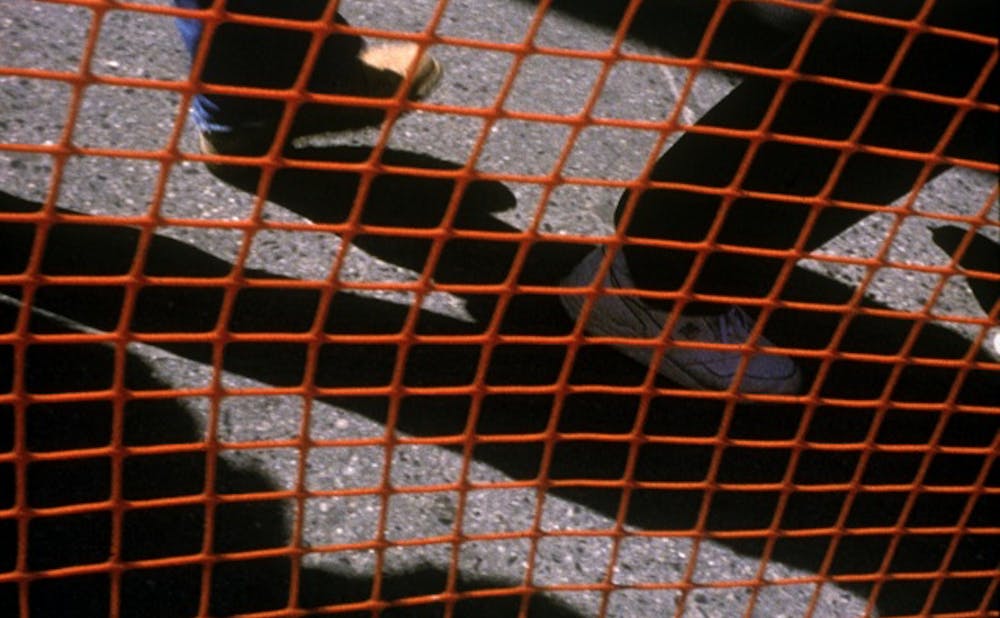On a snowy evening in 2015, Jason Oppliger went to the Carpentry Shop, just down the street from Smith Warehouse. Now an instructor of Arts of the Moving Image, he was, at the time, a student in the M.F.A. program for Experimental and Documentary Arts, and he was meeting with his Experimental Moving Image class.
This particular class meeting was his first introduction to filmmaker Nathaniel Dorsky, who will visit Duke for a showing of 18 of his films in an event called “18 at 18.” Dorsky will show these experimental films at the Rubenstein Arts Center over the course of four nights, Feb. 2 to Feb. 5, starting at 7 p.m. each night. Three of those films will be world premieres — Dorsky completed them earlier this year as part of a seven-film series titled the “Arboretum Cycle.”
Oppliger said his introduction to Dorsky changed the way he thought about making and editing films. He then realized that Dorsky was still creating and screening new films.
“I think that just knowing that this person is around, it’s like, ‘Well, why not? Why not get them here, have them show these films and talk about them because they are here?’” Oppliger said. “It’s so rare to have an artist of that caliber still around, just available, just making work and doing their thing.”
“18 at 18” provides an opportunity for the graduate students in the M.F.A. program to interact with Dorsky and immerse themselves in his work in a way that could not happen otherwise. The screenings are also free and open to the public. Ted Mott, assistant director of the M.F.A. program, said people from as far as Nashville will attend the event because of both the volume of films and the opportunity for a Q&A with Dorsky, who is a well-known figure in experimental film.
“He’s a very revered film artist,” said Tom Rankin, director of the M.F.A. program and professor in the practice of art. “He’s the kind of person that our students study in class, but don’t necessarily imagine being able to see in person.”
Students study Dorsky to understand his vision and the way he constructs his films. They also often read excerpts of his book, “Devotional Cinema,” which Rankin said is now a “classical” text in the teaching of film.
Dorsky has been creating films since 1963, according to his website. He shoots silent films on 16-millimeter film at 18 frames per second, rather than the more common 24 frames per second used in cinematic film. In recent years, he has screened his work at the Northwest Film Forum in Seattle, the Pacific Film Archive and the Harvard Film Archive. Dorsky has also shown his films abroad, such as in a cathedral in Lyon, France.
Due to the technical needs of projecting at 18 frames per second, the department likely could not have invited Dorsky in past years. The opening of the Rubenstein Arts Center, with a new projection booth that has these capabilities, allowed the department to invite Dorsky to screen.
Dorsky also had a role in planning the event. He chose which films to show, and he chose to keep the event at a manageable size.
“He’s passionate about things being what he calls ‘human-scaled,’” Mott said. “He didn’t want the scale of the project to outsize anyone’s ability to experience it.”
Oppliger similarly called Dorsky’s films “generous.” He said the films show the world through a different lens, specific to Dorsky’s vision.
“I think Nathaniel Dorsky is trying to show us the world again in a certain way, in a refreshed form,” Oppliger said. “That’s what I think these films are to me at least, an experience at getting to explore the world all over again, but through a very specific filmic language that Nathaniel Dorsky has basically developed over the years.”
The lack of sound in Dorsky’s films creates an increased emphasis on the visual. Mott said silent films tend to feel more “exhibited,” with longer shots and more attention paid to the montage.
Rankin said seeing silent films is a “transformative” experience. For people who work with film regularly or did not grow up in the digital age, he said, it is easy to forget that seeing any silent projected film is a new experience for most people. His students start to see the world differently when they learn about the medium.
“They’re never the same,” Rankin said. “They start working with these little pieces of film that they string together and they start creating a sensibility that light is projected through and it really does change the way that they think about the image.”
Get The Chronicle straight to your inbox
Signup for our weekly newsletter. Cancel at any time.

